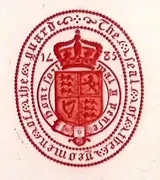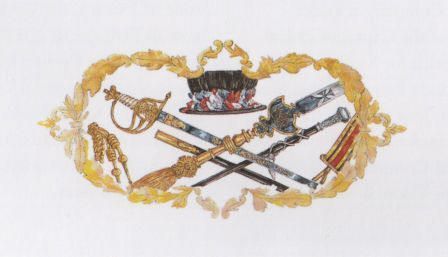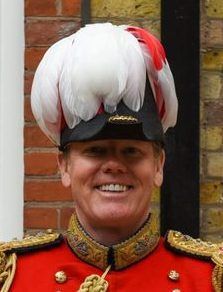Colonel Jonathan CC Schute OBE - Royal Green Jackets. Appointed Clerk of the Cheque and Adjutant 1 April 2024
The Officer below the rank of Lieutenant is the Clerk of the Cheque and Adjutant, although until 1 Aug 1927 it was the appointment of Ensign that was the rank after Lieutenant. His Majesty King George V commanded that the rank of Clerk of the Cheque, being of greater authority than that of Ensign, became senior to it. Clerk of the Cheque is the oldest paid officer in the Corps and the post is extremely ancient. Long before the formation of the Body Guard the office of Clerk of the Cheque was usual in the royal households and also in the establishments of the highest of the nobility. His duty was to keep the checkroll or “checker-roll”, which was a book containing the names of the household servants. In an old dictionary he is described as “an officer who has the check and controlment of the Yeomen of the Guard and all the Ushers belonging to the Royal family”. He never was the paymaster of the Corps and had nothing do with “cheques” in the modern meaning of that word. He was and is to all interest and purpose the Adjutant and secretary of the Guard, residing in the Palace, keeping the Order Book, attending all parades, and preparing the quarterly statements. It was customary at coronations to knight the Clerk of the Cheque. Sir Francis Clarke, who filled the office in 1712, was knighted on the coronation of George I, on 20 October, 1714. Several subsequent Clerks of the Cheque were also similarly honoured, but Coles Child, who held the appointment in the reigns of George III, and George IV, was several times offered the distinction, but, on account of his retiring habits he could not be prevailed upon to accept it.
The silver-topped ebony baton was not carried by the Clerk of the Cheque till 1787, when one was given to Francis Barker Esq, of the Exons, on his promotion, by order dated 5 July 1787. The present regulations require that before appointment the Clerk of the Cheque must have held a commission as a lieutenant-colonel or major in the regular army or in the marines or Indian army. Until Charles II, re-organised the Guard in 1660, the salary of the Clerk of the Cheque was 2s 6d per day, with fees, residence, and table-money. List of Clerks of the Check and Adjutant


